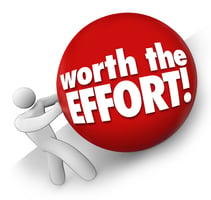Pay Yourself First
Are you currently maxing your contribution to your 401k or 403b? If not, you may be missing some big tax and retirement benefits. Three of the most important things to understand in order to capture these benefits are:
- Reducing Your Current Tax Bill
- Compounding Investment Dollars
- Clearing the Hurdle to Get Started
Endogenous Factors
Your ability to contribute to your tax-deferred retirement account, like a 401k or 403b in particular is something that is totally within your control. As such, it is a change that you can make regardless of what the market is doing or any other exogenous factors like what Jim Kramer might be shouting about on CNBC. The good news is that maximizing the factors that are within your control is the best way to ensure your eventual financial success.
Tax Reduction
In 2015, the limit for contributing to your 401k is $18,000 if you are under 50 years old and $24,000 if you are over 50. If you get paid twice a month, a contribution of $250 per pay period equates to $6,000 per year. If you are in the 28% tax bracket, that means that your are reducing your tax bill by $1,680 for every year that you make the contribution.
Compare that to the maximum limit. In the same case, if you were to contribute $18,000 per year, that would reduce your tax bill by $5,040. That is an additional $3,360 in taxes that you don't pay this year by increasing the contribution. That's great and it's only part of the story.
No Time Like The Present
Compounding a very powerful factor when trying to accumulate your retirement nest egg over time. To illustrate this point, lets take a hypothetical example. You are 30 years old and you start right now investing $10,000 per year until you retire at age 65. If you earn a 7% rate of return over that time period, you could expect to accumlate $1,382,369 by the time you retire. If you wait until you turn 40 to start saving the same $10,000, you can expect to accumulate $632,490 by the time you retire at 65. That's a difference of $749,879. While this only an example, it really illustrates the point. Waiting to start saving has a large cost.
Start Small
If you're willing to consider the above, and you aren't currently maxing your 401k contribution, you may be struck by another thought. How much of an impact is that going to have on my take home pay? The chinese philsopher Lao Tzu advised that "the journey of 1000 miles begins with a single step." The size of the step is not important. What's important is to start stepping. This can be as simple as increasing your payroll contribution by $50 per paycheck. You may be surprised how you don't miss the money after a few months. Then increase it to $100. For even more control, you can create a spending plan to really make decisions about your values and where your money goes.
Bring it All Together
The combination of these three factors is a really powerful mix that can energize your progress toward retirement. To summarize, they are:
- Cut your tax bill
- Gain the benefit of investing over time
- Get started now
If you're able to get take control of these factors, you really do yourself a favor and set yourself on a strong course toward retiring with confidence.
